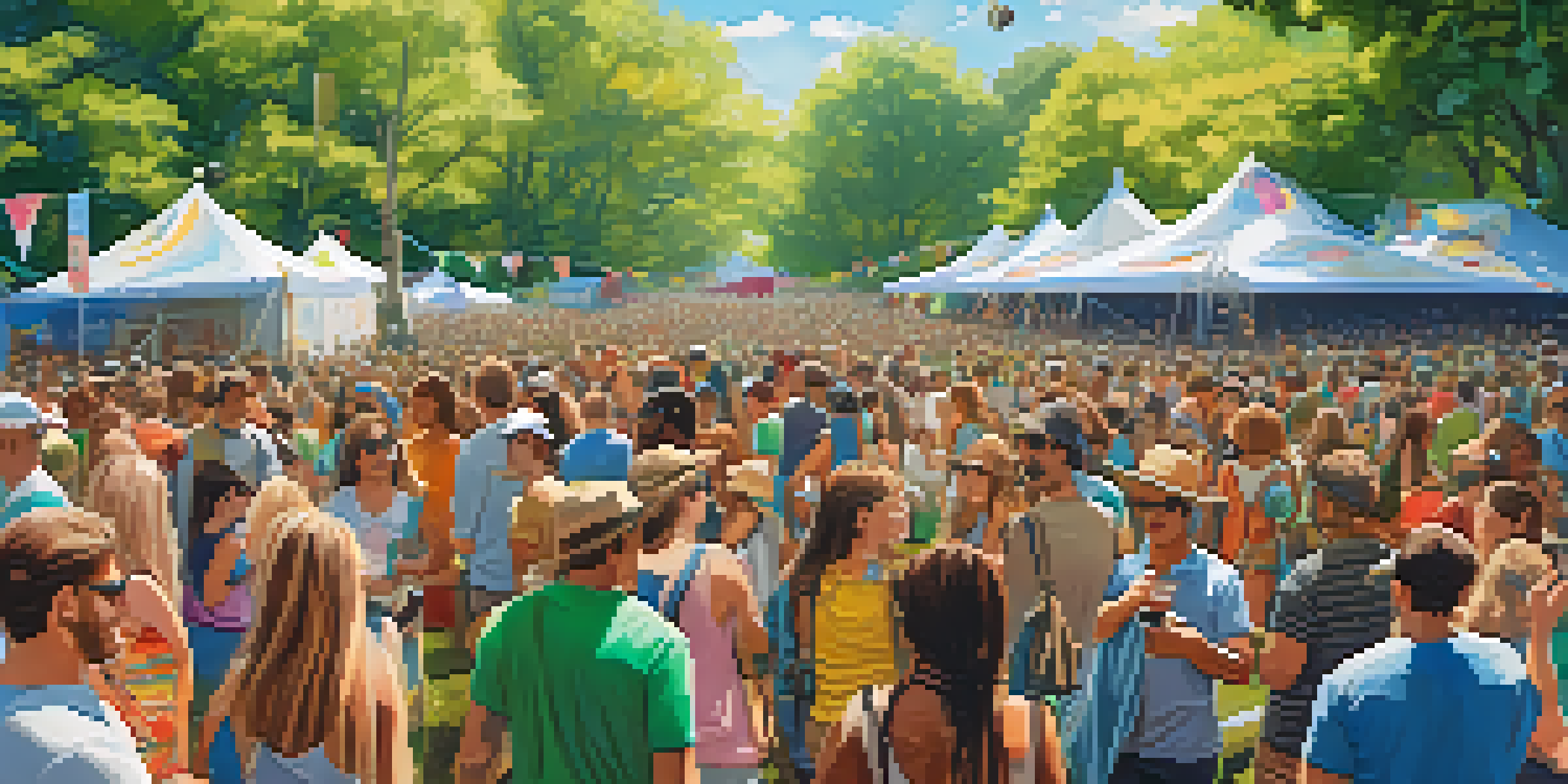Artists Collaborating for a Greener Future in Music

The Power of Music in Environmental Advocacy
Music has a unique ability to connect people and inspire change. Artists have long used their platforms to raise awareness about social issues, and environmental sustainability is no exception. By harnessing the emotional power of music, they can communicate complex ideas and motivate fans to take action.
Music can change the world because it can change people.
For example, songs with themes of nature preservation or climate change can resonate deeply with listeners, encouraging them to reflect on their environmental impact. When artists share their personal stories related to the environment, it humanizes the issues and makes them more relatable. This connection can ignite a passion for sustainability among fans.
Moreover, the collaboration between various artists amplifies this message. By uniting diverse voices, they create a more powerful and inclusive call to action, inspiring a wider audience to join the cause for a greener planet.
Collaborative Projects Promoting Sustainability
Many artists are coming together to work on projects that highlight environmental issues. Initiatives like 'Green Music Initiative' and 'Music for the Earth' have become platforms where musicians collaborate to create songs and organize events focused on sustainability. These projects not only raise awareness but also fund environmental initiatives.

Take, for instance, the collaboration between pop icons and indie artists to release a compilation album dedicated to climate action. The proceeds often support organizations working on renewable energy and conservation efforts. This collective effort showcases the impact that a united front can have, both musically and socially.
Music Inspires Environmental Action
Artists use their platforms to raise awareness and inspire fans to take action on sustainability issues.
Such collaborations serve as a reminder that every artist, regardless of their genre or background, can contribute to the larger narrative of sustainability. By pooling resources and talents, they can reach audiences that might not have engaged with environmental issues otherwise.
Eco-Friendly Concerts and Festivals
Concerts and music festivals are notorious for their environmental impact, but many artists are now advocating for greener practices. Events like Coachella and Glastonbury have started implementing eco-friendly measures, such as waste reduction programs and renewable energy sources. Artists are often at the forefront of these initiatives, encouraging fans to participate in sustainability efforts.
The power of music is such that it can inspire action, evoke change, and unite people for a common cause.
For instance, some festivals offer incentives for attendees who carpool or use public transport, promoting a greener way to enjoy live music. Artists might also engage fans by hosting workshops or discussions about sustainability during the event. This creates a community focused on environmental action, amplifying the message beyond just the music.
By promoting eco-conscious practices, artists not only reduce their carbon footprint but also set an example for their followers. This culture of sustainability can inspire a ripple effect, encouraging fans to adopt greener habits in their own lives.
Sustainable Merchandise and Products
Another avenue through which artists are promoting sustainability is through their merchandise. Many musicians are opting for eco-friendly materials and ethical production methods for their clothing and accessories. This shift not only reflects their values but also resonates with environmentally conscious fans who want to support sustainable practices.
For example, a band might release a line of t-shirts made from organic cotton or recycled materials, emphasizing their commitment to the environment. By promoting these products, artists can educate their fans about sustainable choices in fashion, making it easier for them to support the cause.
Collaborations Amplify Impact
Joint projects among musicians create a powerful collective voice for promoting environmental initiatives.
These eco-friendly merchandise lines often come with messages about sustainability, encouraging fans to think critically about their consumption habits. In this way, artists can influence their audience’s purchasing decisions while also contributing to a greener future.
Leveraging Social Media for Environmental Change
In the digital age, social media has become a powerful tool for artists to spread their message of sustainability. Platforms like Instagram, Twitter, and TikTok allow musicians to reach millions of fans instantly, sharing their environmental initiatives and encouraging followers to take action. This direct line of communication creates a sense of community and urgency around environmental issues.
For instance, a musician might share a video explaining the importance of reducing plastic waste, along with practical tips for their fans. This kind of content not only informs but also empowers individuals to make changes in their own lives. Artists often use hashtags and challenges to mobilize their audience around specific environmental causes, creating a collective effort.
The ability to engage fans in meaningful discussions about sustainability is crucial. By leveraging social media, artists can keep the conversation alive and inspire their audience to advocate for a greener future together.
The Role of Music Education in Sustainability
Education plays a vital role in fostering a culture of sustainability, and many artists are incorporating this into their initiatives. Music education programs are increasingly focusing on environmental themes, teaching young musicians about the importance of sustainability in their craft. By instilling these values early on, artists can create a new generation of environmentally conscious musicians.
Workshops and seminars led by established artists can be instrumental in this educational effort. For instance, a renowned musician might host a session on how to create music using recycled materials or discuss the impact of music festivals on the environment. These experiences not only inspire creativity but also highlight the importance of responsible practices.
Eco-Friendly Practices in Concerts
Many music events are adopting sustainable practices, encouraging fans to participate in eco-conscious behaviors.
By integrating music and sustainability in education, artists can foster a deeper understanding of environmental issues. This not only benefits the students but also enriches the music industry as a whole, promoting a culture that values and prioritizes the planet.
A Collective Vision for a Greener Future
Ultimately, the collaborations among artists for a greener future in music reflect a collective vision that transcends individual efforts. By joining forces, musicians from various genres and backgrounds can amplify their impact, reaching audiences in a way that resonates deeply. This unity fosters a sense of community and shared purpose among fans, encouraging them to take action.
As more artists embrace sustainability, the music industry can transform into a powerful advocate for environmental change. The combination of music and activism creates a vibrant platform for raising awareness, inspiring action, and driving meaningful change in society.

In embracing this collective vision, artists not only contribute to a healthier planet but also enrich their own artistic journey. The future of music is not just about entertainment; it's about using that platform to pave the way for a more sustainable world.